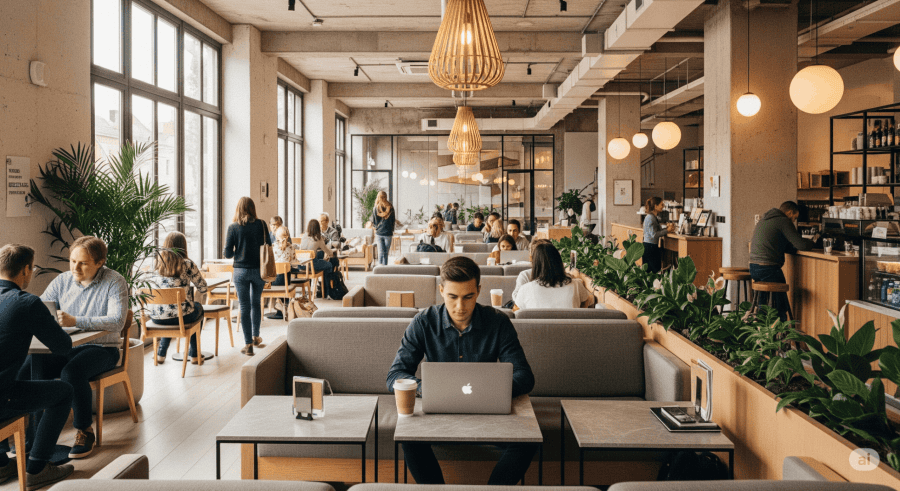
Volume Matters
In Japan and much of East Asia, silence is seen as a form of respect — especially in small, shared spaces. Taking calls or watching videos without headphones? Total faux pas.
By contrast, in Latin America, especially places like Colombia or Argentina, cafés are lively social hubs. A bit of chatter? Totally expected — just keep your work conversations low-key.
Subtle tip: When in doubt, match the room. Are locals whispering or laughing out loud? Let that guide your tone.
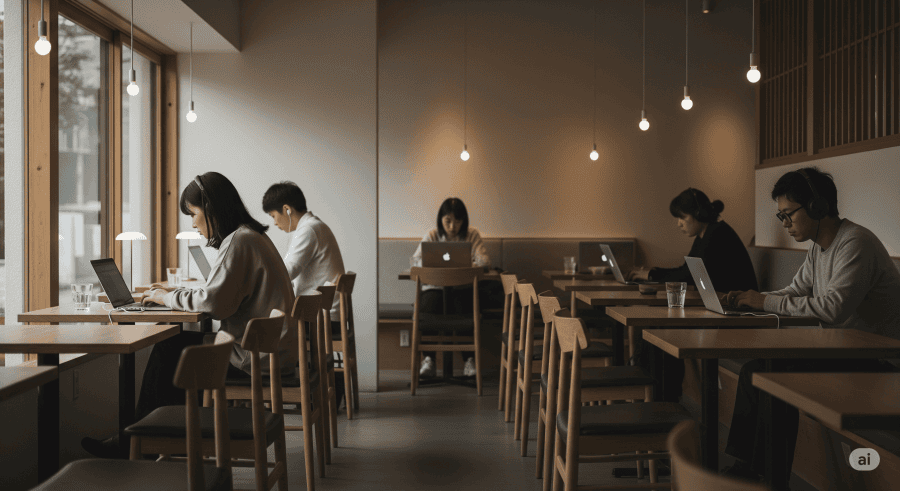
One Drink = One Hour? Not Always.
In France, nursing a single espresso for hours is almost an artform — no one will rush you. But in the U.S., you’re usually expected to keep buying if you’re staying long.
In Vietnam, many café-goers order food or specialty drinks and stay for hours — but large cafés are built for that. In Italy, on the other hand? Coffee is often enjoyed standing up — laptops feel out of place.
Global cue: Look around. Are people working? Eating? Leaving after 20 minutes? That tells you a lot.
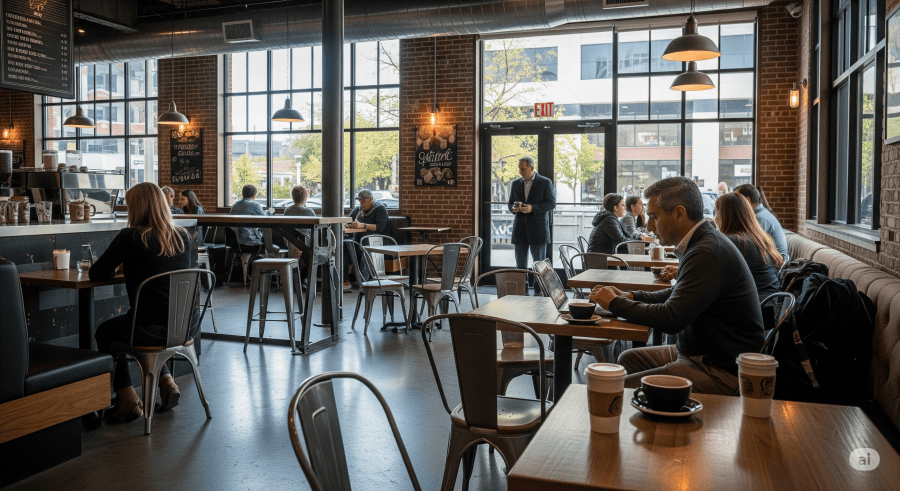
The Power (Outlet) Dynamic
In Germany and Australia, some cafés offer outlets — but many don’t, on purpose. Bringing a fully charged device is part of the etiquette.
In Thailand or Bali, cafés often cater to remote workers — with outlet access and even coworking areas. Still, don’t monopolize the only socket near the entrance.
Modern etiquette: Don’t be a cable octopus. Keep it neat, minimal, and ask before plugging in.
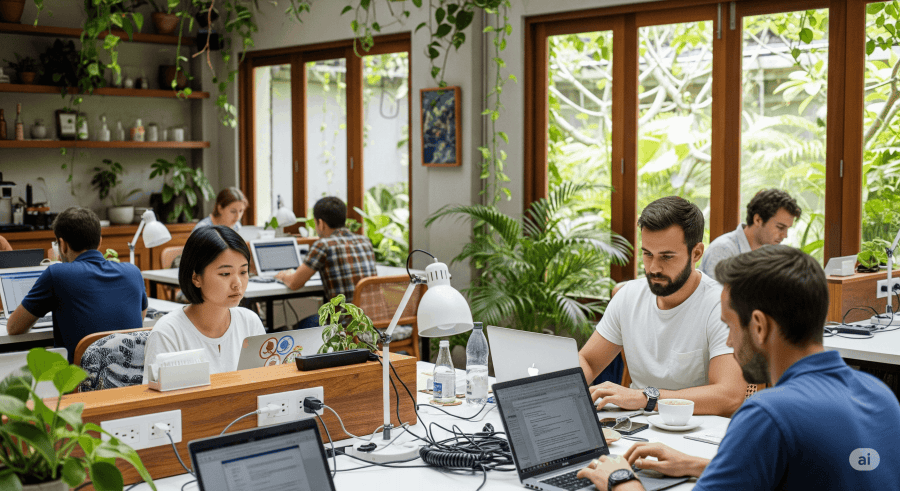
Table Territory
In Scandinavia, solo diners often sit at larger tables and leave space for others — especially in busy cafés. Don’t spread out unless the place is empty.
In New York or London, taking a four-top during lunch rush with just your laptop? Major no-no. Time your stay around peak hours — or sit at the bar if available.
Clean Desk Policy
Universal rule: leave the space better than you found it. Crumpled napkins, water rings, or tangled chargers? Not the vibe. Show appreciation by tidying up — and tipping when appropriate.
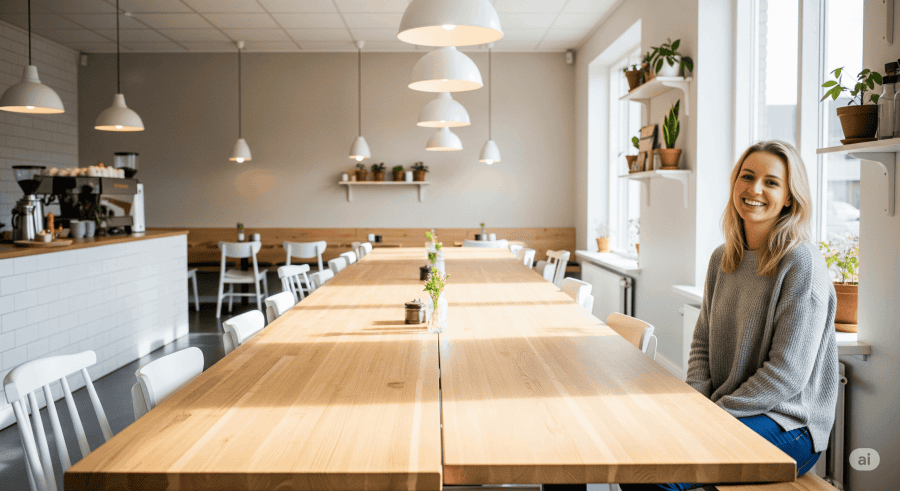
Small Gestures, Big Respect
Café etiquette isn’t about rules — it’s about awareness. A quick glance, a polite nod, a second coffee — they go a long way.
Whether you’re setting up in a bustling café in São Paulo or a quiet spot in Kyoto, tuning in to the local flow shows you’re not just a visitor — you’re part of the rhythm.
So next time you crack open your laptop near an espresso machine, remember:
you’re not just working — you’re sharing space.

Curious About Café Culture?
Q: How long is it okay to stay at a café while working?
A: Depends on the country. In the US or Germany, 2–3 hours is often fine with a purchase. In Japan or Italy, shorter stays are expected — especially if seating is limited.
Q: Is it okay to take video calls?
A: Generally yes — if done respectfully. Use headphones, keep your voice low, and avoid long conversations in quiet cafés or communal spaces.
Q: What if I don’t see anyone else working?
A: That might signal that the café isn’t laptop-friendly. In some cultures, cafés are more for socializing or dining — not working.
Q: Should I tip differently if I’m staying longer?
A: Great question! In tipping cultures like the US or Canada, leaving a generous tip is appreciated if you’re staying for hours. In countries without tipping customs (like Japan), it’s not expected — but always buy something.
Q: Is using the café’s power outlets okay everywhere?
A: Not always. In some places, it’s considered intrusive unless explicitly offered. Best to ask — or bring a portable charger if unsure.
Q: Can I order just one drink and stay?
A: In some cafés, yes — especially in cities with a strong freelancer culture. In others, especially smaller or family-run spots, it’s respectful to order something every hour or so.
Final Sip
Wherever you work from, remember: good manners travel. The most powerful Wi-Fi connection? Respect. It works in every language.
